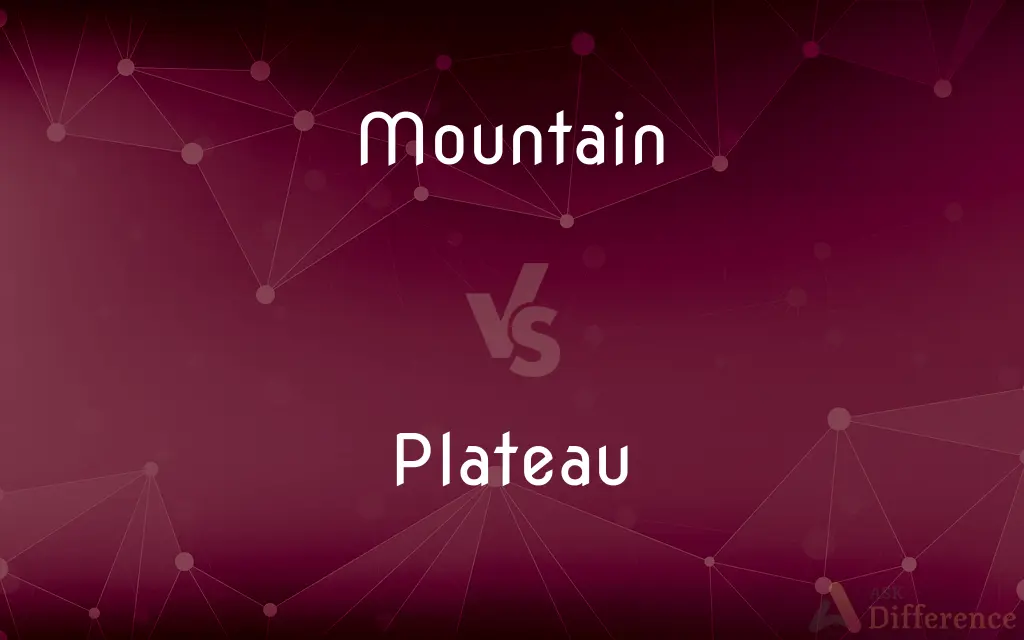Mountain vs. Plateau — What's the Difference?
Edited by Tayyaba Rehman — By Maham Liaqat — Updated on March 25, 2024
A mountain is a natural elevation of the earth's surface with steep sides and a peak, often formed by tectonic forces or volcanism. A plateau is flat, elevated landform that rises sharply above the surrounding area, typically formed by volcanic activity.

Difference Between Mountain and Plateau
Table of Contents
ADVERTISEMENT
Key Differences
Mountains are characterized by their significant height and steep slopes, forming as a result of tectonic plates colliding and pushing the earth's crust upwards, or through volcanic activity where magma erupts and piles up on the surface. Plateaus, while also elevated, are distinguished by their relatively flat tops and are often referred to as tablelands. They can form through various geological processes, including the erosion of surrounding land that leaves a high flat surface or the uplift of a large flat area of the earth's crust.
The environment and climate of mountains can change dramatically with elevation, leading to distinct ecological zones on the same mountain. The base of a mountain may support one type of ecosystem, while the peak may support another, vastly different one. Plateaus, despite their elevation, tend to have a more uniform climate across their surface, but the climate can vary significantly from the surrounding lower land, often being cooler and drier.
Mountains are often found in ranges or groups, forming extensive chains that can span continents, such as the Rockies or the Himalayas. Plateaus can also cover large areas but are typically isolated features rather than part of a continuous chain. They can be surrounded by steep cliffs, making them appear as an elevated island above the surrounding terrain.
The cultural and economic significance of mountains includes tourism, recreation, and often, spiritual significance, with many cultures holding mountains in high regard. Plateaus also have significant cultural importance, offering arable land at high elevations, strategic military locations, and unique habitats for diverse flora and fauna.
In terms of their formation, the processes leading to the creation of mountains and plateaus can sometimes overlap, with plateaus forming as a result of the same tectonic activities that create mountains. However, the distinguishing feature is the flatness of the plateau’s surface compared to the peaked and rugged nature of mountains.
ADVERTISEMENT
Comparison Chart
Definition
A natural elevation with steep sides and often a sharp peak.
An elevated flat-topped area sharply rising above surrounding land.
Formation
By tectonic forces, erosion, or volcanic activity.
By volcanic activity, erosion, or uplift of the earth’s crust.
Topography
Steep, with a pronounced summit.
Flat or gently undulating surface.
Climate
Varies with elevation; cooler and wetter at higher altitudes.
Generally cooler and drier than surrounding areas.
Ecological Zones
Diverse, changing with altitude.
More uniform across the surface.
Examples
Mount Everest, Rocky Mountains.
Colorado Plateau, Tibetan Plateau.
Cultural Significance
Often considered sacred, attract tourism.
Strategic locations, unique ecosystems.
Compare with Definitions
Mountain
A steep natural elevation of the earth’s surface.
Mount Everest is the world's highest mountain.
Plateau
Can have a cooler, drier climate.
The plateau's climate is significantly different from the lowlands.
Mountain
Supports diverse ecosystems.
The mountain range is home to numerous endemic species.
Plateau
Often formed by volcanic activity or uplift.
The Deccan Plateau was formed by volcanic eruptions millions of years ago.
Mountain
Sites of recreational activities.
They went hiking in the mountains during their vacation.
Plateau
A flat, elevated landform that rises sharply above the surrounding area.
The Colorado Plateau is known for its stunning landscapes.
Mountain
Often formed by tectonic forces or volcanism.
The Andes were formed by the collision of tectonic plates.
Plateau
Characterized by its flat top.
The vast plateau stretched out under the open sky.
Mountain
Characterized by its peak.
The mountain's peak was covered in snow year-round.
Plateau
Offers unique habitats for wildlife.
Endangered species thrive on the isolated plateau.
Mountain
A mountain is an elevated portion of the Earth's crust, generally with steep sides that show significant exposed bedrock. A mountain differs from a plateau in having a limited summit area, and is larger than a hill, typically rising at least 300 metres (1000 feet) above the surrounding land.
Plateau
In geology and physical geography, a plateau ( , , or ; French: [pla.to]; plural plateaus or plateaux), also called a high plain or a tableland, is an area of a highland consisting of flat terrain, that is raised sharply above the surrounding area on at least one side. Often one or more sides have deep hills.
Mountain
Abbr. Mt. or Mtn. A natural elevation of the earth's surface having considerable mass, generally steep sides, and a height greater than that of a hill.
Plateau
An area of fairly level high ground.
Mountain
A large heap
A mountain of laundry.
Plateau
A state of little or no change following a period of activity or progress
The peace process had reached a plateau
Mountain
A huge quantity
A mountain of trouble.
Plateau
Reach a state of little or no change after a period of activity or progress
The industry's problems have plateaued out
Mountain
(countable) An elevation of land of considerable dimensions rising more or less abruptly, forming a conspicuous figure in the landscape, usually having a small extent of surface at its summit.
Everest is the highest mountain in the world.
We spent the weekend hiking in the mountains.
Plateau
An elevated, comparatively level expanse of land; a tableland.
Mountain
(countable) Something very large in size or quantity; a huge amount; a great heap.
He was a real mountain of a man, standing seven feet tall.
There's still a mountain of work to do.
Plateau
A relatively stable level, period, or state
Mortgage rates declined, then reached a plateau.
Mountain
(figuratively) A difficult task or challenge.
Plateau
To reach a stable level; level off
"The tension seemed to grow by degrees, then it plateaued" (Tom Clancy).
Mountain
Wine from Malaga made from grapes that grow on a mountain.
Plateau
A largely level expanse of land at a high elevation; tableland.
Mountain
(cartomancy) The twenty-first Lenormand card.
Plateau
(of a varying quantity) A comparatively stable level after a period of increase.
Mountain
A large mass of earth and rock, rising above the common level of the earth or adjacent land; earth and rock forming an isolated peak or a ridge; an eminence higher than a hill; a mount.
Plateau
(dated) An ornamental dish for the table; a tray or salver.
Mountain
A range, chain, or group of such elevations; as, the White Mountains.
Plateau
A notable level of attainment or achievement.
Mountain
A mountainlike mass; something of great bulk; a large quantity.
I should have been a mountain of mummy.
Plateau
(intransitive) (of a varying quantity) To reach a stable level after a period of increase; to level off.
Mountain
Of or pertaining to a mountain or mountains; growing or living on a mountain; found on or peculiar to mountains; among mountains; as, a mountain torrent; mountain pines; mountain goats; mountain air; mountain howitzer.
Plateau
A flat surface; especially, a broad, level, elevated area of land; a table-land.
Mountain
Like a mountain; mountainous; vast; very great.
The high, the mountain majesty of worth.
Plateau
An ornamental dish for the table; a tray or salver.
Mountain
A land mass that projects well above its surroundings; higher than a hill
Plateau
A relatively flat highland
Mountain
A large number or amount;
Made lots of new friends
She amassed a mountain of newspapers
Mountain
Relating to or located in mountains;
Mountain people
Common Curiosities
What are some examples of mountains and plateaus?
Examples of mountains include Mount Everest and the Rocky Mountains; plateaus include the Colorado Plateau and the Tibetan Plateau.
What distinguishes a mountain from a plateau?
A mountain is characterized by its steep sides and peak, while a plateau is a flat, elevated area.
How are mountains and plateaus formed?
Mountains are formed by tectonic forces, erosion, or volcanism, whereas plateaus can form through volcanic activity, uplift of the earth's crust, or erosion.
Can the climate on a mountain and a plateau be similar?
While both can have cooler climates than surrounding areas, mountain climates vary with elevation, whereas plateau climates are more uniform.
Is it possible for a plateau to become a mountain?
While a plateau itself does not become a mountain, tectonic activities can uplift a plateau, contributing to mountain formation around its edges.
Are there ecosystems unique to mountains or plateaus?
Yes, both can support unique ecosystems; mountains have distinct ecological zones with altitude, while plateaus offer habitats that may be cooler and drier than surrounding areas.
Can plateaus have any relation to mountain ranges?
Plateaus can be adjacent to mountain ranges and may share some formation processes, but they are distinguished by their flat tops.
How do mountains and plateaus affect human life?
Both offer recreational opportunities, have cultural and spiritual significance, and provide unique habitats and climates that influence local agriculture and settlement patterns.
Why are plateaus important for biodiversity?
Their unique climates and isolation can create refuges for diverse species, including many that are endemic or endangered.
How do the formations of mountains and plateaus impact the earth's geography?
They significantly shape the earth's surface, influencing weather patterns, river systems, and the distribution of flora and fauna.
Share Your Discovery

Previous Comparison
Matriclan vs. Patriclan
Next Comparison
Madame vs. MademoiselleAuthor Spotlight
Written by
Maham LiaqatEdited by
Tayyaba RehmanTayyaba Rehman is a distinguished writer, currently serving as a primary contributor to askdifference.com. As a researcher in semantics and etymology, Tayyaba's passion for the complexity of languages and their distinctions has found a perfect home on the platform. Tayyaba delves into the intricacies of language, distinguishing between commonly confused words and phrases, thereby providing clarity for readers worldwide.















































